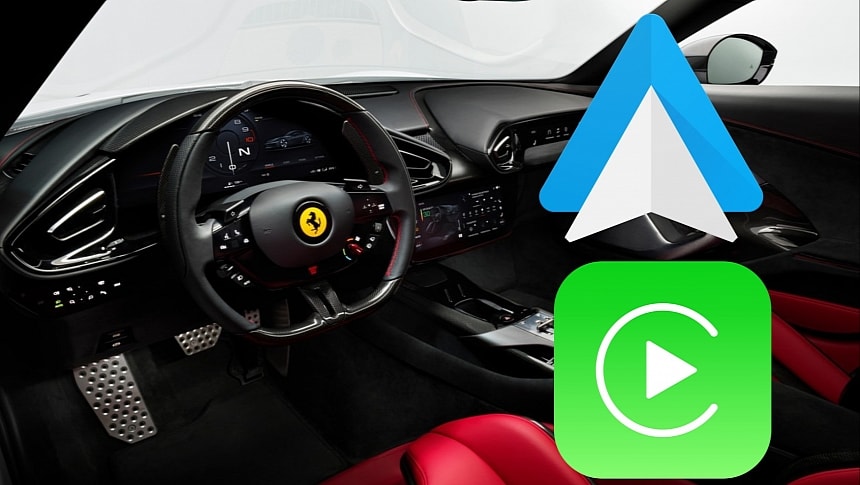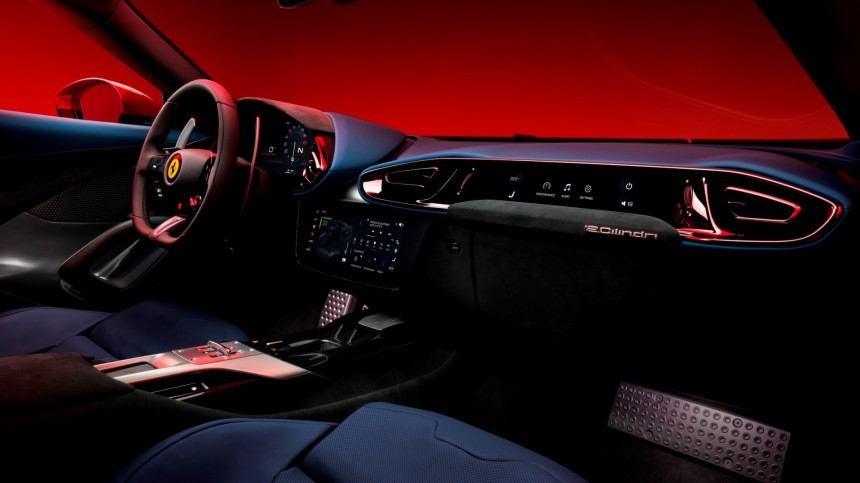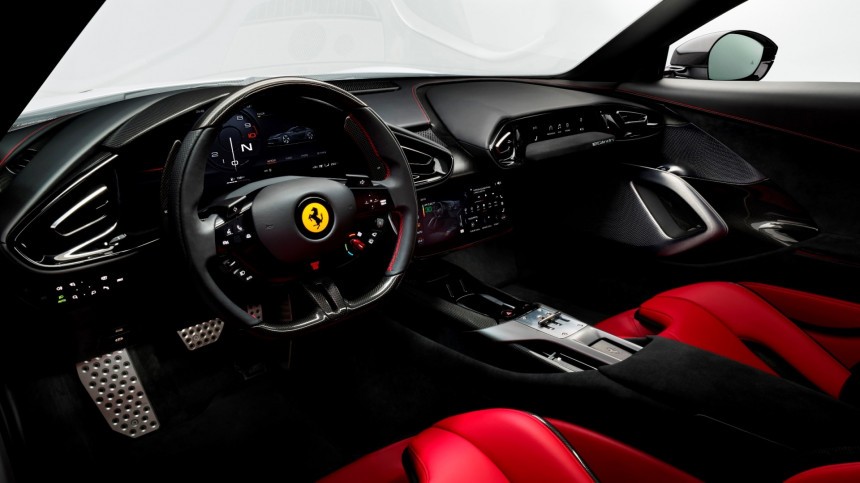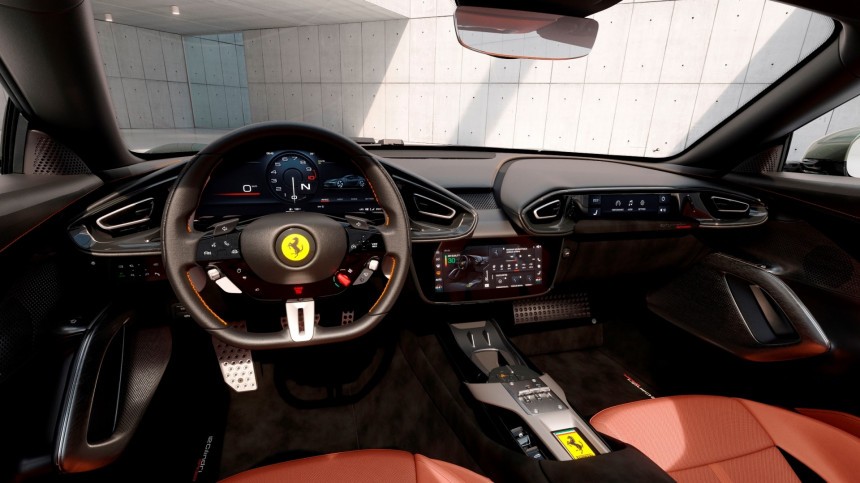Android Auto and CarPlay have become must-have systems for modern drivers, and many customers wouldn't even imagine buying a new car without them.
Apple's numbers speak for themselves. Nearly eight in ten new car buyers are ready to say no to a new vehicle if it doesn't offer CarPlay. Google says the adoption of Android Auto is also on the rise, with over 200 million cars on the road running its software.
The automotive space is now standing at a crossroads. Most carmakers have decided to invest more aggressively in their software, as the trend is turning infotainment into a money-making machine. In contrast, others believe that sticking with Android Auto and CarPlay is the right option from a cost perspective.
Ferrari is the company that admitted defeat to Android Auto and CarPlay for a simple reason. Everybody has a phone, so investing in dedicated navigation software wouldn't make sense in the long term.
Emanuele Carando, Ferrari's head of product marketing, detailed how the carmaker would handle the competition between Android Auto and CarPlay against in-house satellite navigation software.
First, Carando believes systems like Android Auto and CarPlay are "fantastic," providing users with the "most user-friendly possibility." He explains that a system powered by a mobile device is always "the most updated system," as software like Google Maps, Apple Maps, and Waze always come with the latest changes, sometimes almost in real-time. An on-board satellite navigation system needs updates that wouldn't be possible without new OTA releases, which take time and involve additional resources.
Carando says phones powering Apple and Google Maps provide Ferrari customers with "the most useful things they can use on every car."
As a result, Ferrari will no longer offer pre-loaded navigation on its models, beginning with the Purosangue SUV and the 12Cilindri. However, Android Auto and CarPlay will become standard on all models, allowing drivers to get easy access to replacement solutions, such as Google Maps, Apple Maps, and Waze.
Ferrari has a good reason to make this decision. Carando explains that Ferarri customers don't use their cars as everyday drivers, so developing an in-house navigation solution wouldn't make sense for two reasons. First, drivers would have to learn how to use it – because they drive their cars rarely, the learning curve would be more painful, and people wouldn't use the available software. Second, the carmaker would have to spend big bucks on this software for customers to use it every now and then.
Ferrari believes that providing Android Auto and CarPlay connectivity is the right way to address this change of strategy. Drivers can connect their mobile devices to their cars, launch the application they are already familiar with (and which they might already be using regularly in other cars they drive more often), and get better maps, better traffic data, and better everything.
Carmakers originally adopted Android Auto and CarPlay specifically to deal with their lazy software efforts, giving in to Google and Apple for almost everything from navigation to music streaming. Some are now trying to reclaim control of the infotainment system, and General Motors is the name spearheading the war in this direction.
Last year, the company announced a complete change of strategy that involved blocking Android Auto and CarPlay in future models. Beginning with the 2024 Blazer EV, GM's electric cars no longer allow Android Auto and CarPlay. The replacement software is Android Automotive, an embedded operating system that GM says can offer more advanced capabilities compared to a phone-powered experience.
However, leaving Android Auto and CarPlay behind and going all-in on an embedded system also opens the door to subscriptions. Carmakers hope to monetize certain features of the infotainment system, and phone mirroring systems like Android Auto and CarPlay do not allow such a direction.
Tesla and Rivian are two of the biggest names that have not offered Android Auto and CarPlay from the very beginning. The two carmakers invested heavily in their own software, keeping control of the infotainment unit and developing dedicated support for the most popular applications, including Spotify.
Ferrari's new strategy proves that Android Auto and CarPlay are still irreplaceable in the automotive space despite the increasing criticism and calls for more advanced capabilities. Apple and Google are also working around the clock on adding new features and unlocking new app categories, with more developers becoming committed to bringing their apps to the car. The number of apps available on the two platforms keeps growing and will soon skyrocket thanks to new projects – Google recently announced that all apps on the Play Store offering support for large screens would become available in cars running Android Auto and Android Automotive if they match certain criteria.
The automotive space is now standing at a crossroads. Most carmakers have decided to invest more aggressively in their software, as the trend is turning infotainment into a money-making machine. In contrast, others believe that sticking with Android Auto and CarPlay is the right option from a cost perspective.
Ferrari is the company that admitted defeat to Android Auto and CarPlay for a simple reason. Everybody has a phone, so investing in dedicated navigation software wouldn't make sense in the long term.
Emanuele Carando, Ferrari's head of product marketing, detailed how the carmaker would handle the competition between Android Auto and CarPlay against in-house satellite navigation software.
Carando says phones powering Apple and Google Maps provide Ferrari customers with "the most useful things they can use on every car."
As a result, Ferrari will no longer offer pre-loaded navigation on its models, beginning with the Purosangue SUV and the 12Cilindri. However, Android Auto and CarPlay will become standard on all models, allowing drivers to get easy access to replacement solutions, such as Google Maps, Apple Maps, and Waze.
Ferrari has a good reason to make this decision. Carando explains that Ferarri customers don't use their cars as everyday drivers, so developing an in-house navigation solution wouldn't make sense for two reasons. First, drivers would have to learn how to use it – because they drive their cars rarely, the learning curve would be more painful, and people wouldn't use the available software. Second, the carmaker would have to spend big bucks on this software for customers to use it every now and then.
Ferrari believes that providing Android Auto and CarPlay connectivity is the right way to address this change of strategy. Drivers can connect their mobile devices to their cars, launch the application they are already familiar with (and which they might already be using regularly in other cars they drive more often), and get better maps, better traffic data, and better everything.
Not everybody agrees.
While Ferrari isn't the first company to go all-in on Android Auto and CarPlay, it's the first big name to admit that investing in in-house software no longer makes any sense.Carmakers originally adopted Android Auto and CarPlay specifically to deal with their lazy software efforts, giving in to Google and Apple for almost everything from navigation to music streaming. Some are now trying to reclaim control of the infotainment system, and General Motors is the name spearheading the war in this direction.
Last year, the company announced a complete change of strategy that involved blocking Android Auto and CarPlay in future models. Beginning with the 2024 Blazer EV, GM's electric cars no longer allow Android Auto and CarPlay. The replacement software is Android Automotive, an embedded operating system that GM says can offer more advanced capabilities compared to a phone-powered experience.
Tesla and Rivian are two of the biggest names that have not offered Android Auto and CarPlay from the very beginning. The two carmakers invested heavily in their own software, keeping control of the infotainment unit and developing dedicated support for the most popular applications, including Spotify.
Ferrari's new strategy proves that Android Auto and CarPlay are still irreplaceable in the automotive space despite the increasing criticism and calls for more advanced capabilities. Apple and Google are also working around the clock on adding new features and unlocking new app categories, with more developers becoming committed to bringing their apps to the car. The number of apps available on the two platforms keeps growing and will soon skyrocket thanks to new projects – Google recently announced that all apps on the Play Store offering support for large screens would become available in cars running Android Auto and Android Automotive if they match certain criteria.








































